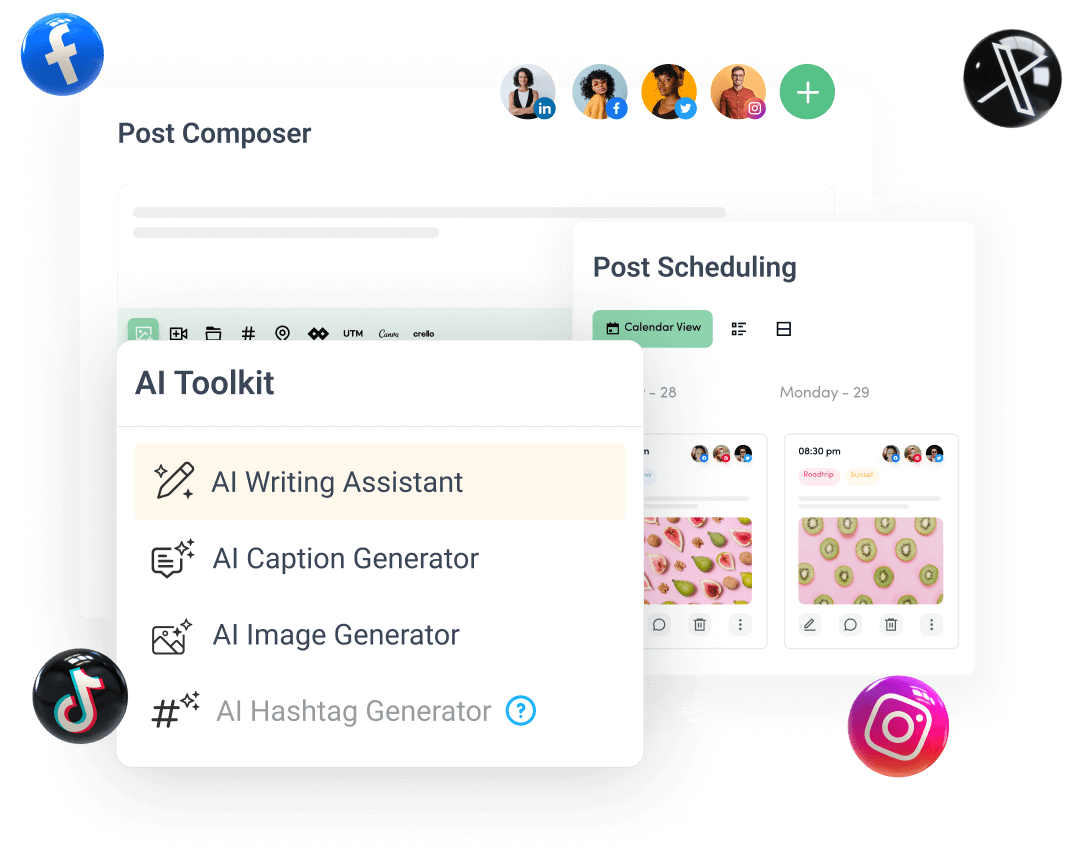Bulk-generate & schedule posts in seconds with Smart Scheduling. Try now!
Demographics

What are demographics?
Demographics refers to the statistical characteristics of human populations, including age, gender, income, education level, occupation, and location. In digital marketing, demographics are essential data points that help businesses understand their audience composition, enabling them to create more targeted and effective marketing strategies.
Key demographic factors in digital marketing
Primary demographic characteristics
- Age groups and generations
- Gender and gender identity
- Income levels and economic status
- Educational background
- Geographic location
- Occupation and employment status
- Marital status and family composition
- Cultural and ethnic background
Secondary demographic indicators
- Lifestyle choices
- Technology adoption rates
- Social media platform preferences
- Shopping behaviors
- Media consumption habits
Importance of demographics in marketing strategy
Target audience identification
Understanding demographics is crucial for identifying and reaching your target audience. This knowledge helps in creating social media marketing strategies that resonate with specific audience segments.
Content personalization
Demographics inform content creation and personalization efforts, allowing marketers to craft messages that speak directly to different audience segments, as highlighted in content marketing strategy guides.
Channel selection
Different demographic groups prefer different platforms and communication channels. Understanding these preferences helps in choosing the right social media marketing platforms for your campaigns.
Demographic analysis tools and methods
Social media analytics
Platforms like ContentStudio's analytics tools provide detailed demographic insights about your social media audience, helping you understand who engages with your content.
Market research
Comprehensive market research combines demographic data with other insights to create detailed audience profiles and market segments.
Competitive analysis
Tools like the Instagram competitor analytics tool help understand the demographic composition of competitors' audiences.
Applying demographics in business strategy
Product development
Demographics influence product development and feature prioritization based on the needs and preferences of target age groups and market segments.
Marketing communications
Understanding demographics helps in crafting appropriate messaging and selecting relevant content marketing tools for different audience segments.
Business planning
Demographics inform business expansion strategies, market entry decisions, and long-term planning.
Demographics in social media marketing
Platform-specific demographics
Different social media platforms attract distinct demographic groups. Understanding these patterns is crucial for social media marketing for small businesses.
Content strategy alignment
Align your content strategy with demographic preferences, as explained in guides for growing your online business.
Engagement optimization
Use demographic insights to optimize engagement strategies and create content that resonates with your target audience's preferences.
Generation-specific marketing approaches
Marketing to Gen Z
Understanding the unique characteristics of Generation Z is crucial for modern marketing, as outlined in Gen Z marketing guides.
Millennial marketing
Tailoring strategies to millennial preferences and behaviors requires specific demographic understanding and approach.
Multi-generational marketing
Creating strategies that effectively reach and engage multiple demographic groups simultaneously.
Demographics and content personalization
Content mapping
Create content that maps to different demographic segments' interests, needs, and preferences.
Channel optimization
Optimize content distribution channels based on demographic usage patterns and preferences.
Message customization
Customize messaging and tone based on demographic characteristics and preferences.
Measuring demographic impact
Analytics and tracking
Use social media analytics tools to track performance across different demographic segments.
ROI analysis
Measure return on investment for campaigns targeting specific demographic groups.
Performance optimization
Use demographic insights to continuously optimize marketing performance and engagement.
Future trends in demographic targeting
AI and machine learning
Artificial intelligence is enhancing demographic analysis and targeting capabilities, as discussed in articles about the future of social media.
Privacy considerations
Balancing demographic targeting with increasing privacy concerns and regulations.
Dynamic segmentation
Moving toward more dynamic and fluid demographic segmentation models.
Best practices for demographic targeting
Data accuracy
Ensure demographic data is accurate and regularly updated.
Ethical considerations
Maintain ethical practices in demographic targeting and avoid discriminatory practices.
Testing and validation
Regularly test and validate demographic assumptions and targeting strategies.
Common challenges in demographic targeting
Data collection
Gathering accurate demographic data while respecting privacy concerns.
Market evolution
Keeping up with changing demographic patterns and preferences.
Segmentation balance
Finding the right balance between broad and narrow demographic targeting.
Industry-specific demographic considerations
B2B marketing
Understanding demographic factors in B2B content marketing strategy.
E-commerce
Applying demographic insights in social media marketing for e-commerce stores.
Service industries
Tailoring demographic approaches for service-based businesses and professionals.
Conclusion
Demographics remain a fundamental component of effective digital marketing strategy. By understanding and properly applying demographic insights, marketers can create more targeted, relevant, and successful campaigns. As technology evolves and markets become more complex, the ability to effectively analyze and apply demographic data becomes increasingly crucial for marketing success.

Create, plan, schedule, and publish posts on all social media networks
Recommended for you


Powerful social media management software
14-day free trial - No credit card required.


